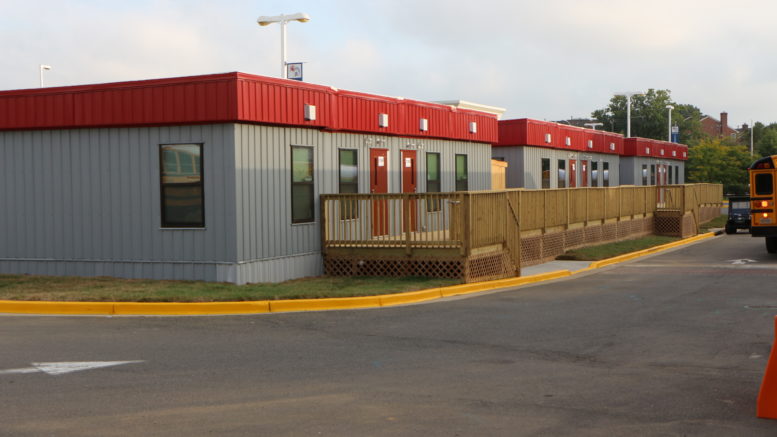By Alexis Larsen, Reagan Feld, and Sadie Finn
The T.C. Williams King Street campus was built to hold 2,500 students. 3,503 students are currently enrolled in the school. Because of the increasing overcrowding in the building, T.C. Williams purchased six trailers, known as villas, as a potential solution.
The villas, which house the foreign languages department, were not ready before the start of the school year, thus the classes that would have been in the villas had to be temporarily relocated to other classrooms throughout the building during the first few weeks of school. Bridget Tomich, a French teacher, said, “We started the year, we did three weeks of being in five different classrooms. That was terrible… I do not know how people do it, people are still doing it now.”
The naming of the “villas” was controversial, especially in the eyes of Justin Redpath, the Latin teacher. In the Ancient Roman days, Redpath said that “villas” were the “home[s] of the well-to-do, the rich, often noble person…” Redpath is vehement about the naming of the “villas” as their name is technically incorrect. “To call the trailers ‘villas’ is condescending and insulting to those who may be forced to occupy them,” said Redpath.
However, after the villas arrived, they have been mostly advantageous. The villas have not affected the learning or teaching that occurs within them. Sophomore Maddie Allen, who takes Spanish in the villas said, “It is not too different in the sense that you still have a classroom, you still have desks, you have most of the stuff you would normally have in a regular classroom.” Senior Kellie Bowman, who takes French in the villas agreed, “It is not really different, I still feel like a part of the school, it is just a different location.”
Similarly, the villas have not affected the tardy rates of the students, although some students have to walk farther than others. Sophomore Jasmine Del Cid Reyes, who takes Spanish in the villas, said, “I have to run from the third floor.” Allen said, “I come from the third floor every day, it is kind of a hike sometimes.” However, the extra minutes help ensure that the students make it on time. Sophomore Erik Jacobsen, who has Spanish in the villas, said, “The seven minutes actually does help get a lot of things done.” Redpath noted that student tardy rates had actually decreased from last year, and said, “The fact that they know they have to travel a bit farther than normal gives them a sense of urgency to their pace.”
One advantage of being outside is that some of the classes integrate the outdoors into their classroom. Tomich gets to “to open the windows” and doors to her classroom and let the air in. Tomich said, “we were doing speaking exercises and people could go outside on the deck, in the sunshine, and just spread out.”
However, the villas are very inconsistent. In some of the villas, the heating and cooling is functioning and consistent. Redpath said, “I can control my own thermostat to a specific degree of temperature, unlike classrooms in the main building.” However, some of the villa’s heating and cooling systems are sub-par. Sophomore Charlotte Despard, who takes Spanish in the villas, said, “it is permanently 85 degrees in there.” Junior Nathan Huguley, a classmate of Despard’s, agreed, saying, “the temperature outside determines the temperature inside.”
The wireless internet in the villas is also inconsistent. In some villas, the wi-fi seems to be better functioning than it is inside of the building. Tomich said, “one day a couple of weeks ago the wi-fi was out inside and we never knew that.” However, in other villas, the wi-fi is much slower. Allen said, “the wi-fi is not great out here all the time.”
Despard said, “The whole concept of the trailers is hot and cold.”

